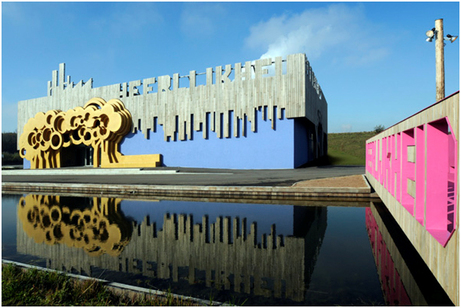-
upcoming events
Madison Greenstone Lampo Performance Series May 04, 2024 Performance
Michelle Lou & Bryan Jacobs Lampo Performance Series Jun 08, 2024 Performance
-
past events
Sentinels: Iron Portals of Chicagoland Cédric Van Parys, 2023–24 Garofalo Fellow Apr 18, 2024 Talk
Ellen Phan Lampo Performance Series Mar 09, 2024 Performance
Owen Gardner Lampo Performance Series Dec 09, 2023 Performance
Madlener House
4 West Burton Place
Chicago, Illinois 60610
Telephone: 312.787.4071
info@grahamfoundation.org

FAT, the Villa, Hoogvliet, the Netherlands, 2008 © Maarten Laupman.
While grand visions are often considered the currency of contemporary architecture, the truth is that compromise—rather, the uncomfortable sensation of being compromised—is the natural state of the architect, and the condition under which architecture is made. For architecture, context is never pure or abstract; it is a site physically, economically, and socially inscribed by competing interests. These compromised positions and scoured surfaces are where architecture’s political and ideological subtexts are revealed. Yet from these cloudy waters, the most innovative, relevant, and unexpected forms can emerge.
Sam Jacob (FAT), Liza Fior (muf), and Damon Rich of Newark will reveal their own complicities and compromises, and discuss how these conditions can become grounds for creative and engaged forms of architecture and urban planning.
Graham grantee Sam Jacob is a director of London-based architecture office FAT, where he has been responsible for award-winning projects in the UK and abroad, such as the Heerlijkheid Hoogvliet (NL), Islington Square(UK), and Sint Lucas Art Academy (NL). Current projects include the BBC Drama Production Village in Cardiff, and CIAC, an 80-unit housing scheme in Northern England. As part of FAT, Jacob has received several awards, including the RIBA European Award (in 2009 and 2007), the Architecture Foundation Next Generation Award (2007), and the FX Award (Best Museum, 2007; Best Public Project, 2005). Jacob has taught and lectured at universities internationally. He is currently professor of architecture at the University of Illinois at Chicago, and unit master at the Architectural Association, London; previously, he has taught at the Yale School of Architecture. Jacob is codirector of the Architectural Doppelgangers Research Cluster at the AA, a design critic for Art Review, and contributing editor to Icon. With Charles Jencks, Sean Griffiths, and Charles Holland, he coedited the recent AD issue Radical Post Modernism. Jacob also writes and edits strangeharvest.com, and contributes to a variety of publications.
Liza Fior was born in London, UK, where she continues to practice as a founding partner of muf architecture/art. Muf negotiates between built and social fabrics, public and private interests, through projects that have been largely, but non-exclusively, focused in East London. These projects range from urban-design schemes to small-scale temporary interventions, from landscapes to buildings—each part of a continual dialogue. Muf's approach—value what’s there, nurture what's possible, and define what’s missing—is currently demonstrated by Making Space in Dalston, which will extend into a series of projects around the fringe of London’s Olympic site. At the 2010 Venice Architecture Biennale, muf turned the British Pavilion into a platform for locally based concerns. Muf's awards include the 2008 European Prize for Public Space (a UK first), for Barking, East London's new "town square." In addition, Fior is coauthor of This is What We Do: A Muf Manual.
Graham grantee Damon Rich is a designer and artist. In exhibitions, graphic works, and events, sometimes produced in collaboration with young people and community-based organizations, Rich creates fantastical spaces for imagining the physical and social transformation of the world. His work represented the United States at the 2008 Venice Architecture Biennale, and has been exhibited at PS 1 Contemporary Art Center, Storefront for Art and Architecture, the Canadian Centre for Architecture, and the Netherlands Architecture Institute. In 1997, he founded the Center for Urban Pedagogy (CUP), a nonprofit organization working to increase the impact of public participation in planning and development, where he served as creative director for ten years. Rich has taught architecture and planning courses at the Cooper Union, Syracuse University, Pratt Institute, and the Parsons School of Design, and has written about architecture and politics for publications including Perspecta, the Nation, Domus, and Architecture. He currently serves as urban designer for the City of Newark, New Jersey, where he leads design efforts with public and private players to improve the city’s public spaces.
Copyright © 2008–2024 Graham Foundation. All rights reserved.